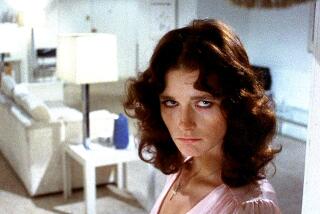Stanwyck Pre-Code Films Due at Melnitz
- Share via
Mae West was not one to complain, but once remarked privately, “I’ve always taken the rap for the Code, but it was really those Barbara Stanwyck pictures that did it.” If you’ve never seen any of Stanwyck’s earliest films, you might well be taken aback at the notion that one of the most admired movie stars could have ever had a screen image racier than that of Diamond Lil.
Regardless of whether West was correct about Stanwyck’s role in bringing about the drastic Production Code revisions of 1934, the truth is that early Stanwyck films were pretty hot stuff; more importantly, a lot of her earliest work has stood the test of time and shown her to be an accomplished, dynamic actress right from the start.
“Night Nurse” (1931) and “Baby Face” (1933), which screen at UCLA Melnitz on Thursday at 8 p.m. as part of the Pre-Code series, are cases in point. For all of William Wellman’s vigorous direction, “Night Nurse” is a dated, if entertaining, melodrama. Yet Stanwyck, Joan Blondell and Clark Gable (in a small role) already have the impact of stars. Stanwyck plays a dedicated novice nurse who’s horror-struck at discovering that her two small charges, both with huge trust funds, are being starved to death under an unscrupulous doctor’s orders. Their silly widowed mother (Charlotte Merriam) is an alcoholic, kept that way by her dominating chauffeur (Gable) who’s in cahoots with the doctor (Rolfe Harolde).
Forget the lurid, contrivance-laden plot; what counts here is the atmosphere, which is gamy indeed, with a wild party sequence and lots of gratuitous scenes with Stanwyck and Blondell in their lacy step-ins. Based on a Dora Macy novel, the film captures the moral chaos and desperation of the post-Crash, pre-Repeal years. To be sure, Stanwyck’s nurse is a determined square-shooter, although she does fall for bootlegger Ben Lyon.
“Night Nurse” seems crude and sketchy alongside the sleek and vital “Baby Face,” a sterling example of the classic woman’s picture at its most stylish and energetic. Its original story was written by Darryl F. Zanuck, (under his usual alias, Mark Canfield) and directed by Alfred E. Green. Stanwyck’s Lily Powers is her archetypal tough dame who sees the light in the last reel. Lily escapes the Erie flat that her brutal father (Robert Barrat) has long before turned into a speakeasy-gambling den. Arriving in New York, Lily shamelessly exploits her feminine wiles as she claws her way to the top of a huge banking conglomerate, leaving in her wake a pile of used or ruined men--played by John Wayne (in only two scenes), Douglas Dumbrille, Henry Kolker, Donald Cook and finally George Brent.
“Baby Face” is vintage fiery Stanwyck. In her bold, glittery Orry Kelly finery Stanwyck’s Lily has the native smarts and sex appeal to persuade us that she really could vamp all these guys--and she also projects the vulnerability beneath the hard surface to make you care about her. This is a soap opera with style and dimension. There are a few refrains from the song “Baby Face,” but her theme is really “St. Louis Woman,” a favorite of her maid-companion Chico (Theresa Harris). “Baby Face” is really more honest than racy, and it’s the kind of film that Stanwyck would often make for the next 30 years. For full schedule: (213) 206-3456, 206-8013.
“The Merchant of Four Seasons” (1971), at the Vagabond Thursday through Saturday, introduced Rainer Werner Fassbinder to Los Angeles audiences as part of a 1974 UCLA German series and hasn’t resurfaced since. An odyssey of a defeated man, the film unfolds via flashbacks, with the key question being whether the hero (Hans Hirschmuller), reduced to peddling fruit, really wants to go on living after suffering a severe heart attack.
What emerges vividly is Fassbinder’s savage delineation of women as devourers, veritable black widows. Thankfully, Fassbinder, for whom life was absurd and therefore occasionally bitterly amusing, is able to move beyond misogyny to protest the bourgeois hypocrisy and materialistic values that have done in his poor hero. In this early work Fassbinder commands respect by the sheer intensity of his unyielding pessimism and by his adroit ability in expressing it. Playing with “The Merchant of Four Seasons” is another early and rarely seen Fassbinder, “Why Does Herr R. Run Amok? (1969). For show times: (213) 387-2171.
More to Read
Only good movies
Get the Indie Focus newsletter, Mark Olsen's weekly guide to the world of cinema.
You may occasionally receive promotional content from the Los Angeles Times.










